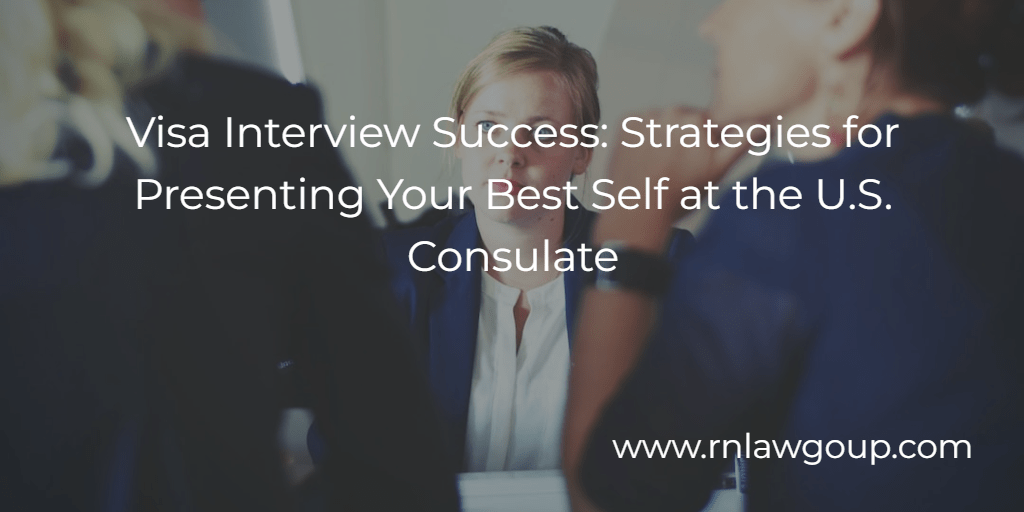
Visa Interview Success: Strategies for Presenting Your Best Self at the U.S. Consulate
People from other countries who want to come to the United States usually need to get a special permission called a “visa” from the U.S. government. This visa is like a stamp that goes in their passport, which is a travel document issued by their own country. When someone has a U.S. visa, they can go to a U.S. port of entry, like an airport or a land border crossing. There, they can ask the Department of Homeland Security (DHS) and Customs and Border Protection (CBP) officer for permission to enter the United States.
Understanding U.S. Visas:
There are different types of visas based on why someone wants to travel to the U.S. The two main categories are nonimmigrant visas (for temporary travel) and immigrant visas (for permanent residency).
For nonimmigrant visa applicants, there are several steps: they usually need to fill out an online form called DS-160, pay a fee, give their biometric information, and might need to attend an interview with a consular officer.
Having a visa doesn’t automatically mean someone can enter the United States. It only shows that a consular officer has said they’re eligible for a specific purpose of travel. CBP officers at the entry points have the authority to decide whether travelers can enter the U.S. They consider the traveler’s status and the time they’re allowed to stay.
Importance of the Visa Interview
Every applicant seeking a Non-Immigrant (temporary) Visa must apply in person and be interviewed by a consular officer unless a specific exception allows for waiver of the interview requirement. This means that if someone wants a temporary visa to visit the U.S., they usually need to go in person to the U.S. embassy or consulate. They’ll talk to a special officer called a “consular officer” who will ask them some questions.
The Visa Officer’s Evaluation
When someone applies for a visa, the officer needs to make sure they fit into one of the specific categories mentioned in the law, such as H-1B worker, F-1 student, or B-1 visitor. When someone applies for a visa to visit the United States, the default assumption by the visa officer is that the person might be considering staying in the U.S. permanently. In other words, they assume that the applicant might want to live in the U.S. for a long time or even settle there permanently unless there’s evidence to suggest otherwise.
So, the burden of proof is on the applicant to demonstrate that they are indeed planning a temporary visit and that they have strong reasons to return to their home country after their stay in the U.S. This is why the visa interview and the application process are important: they provide a chance for the applicant to convince the visa officer that they fall into one of these temporary visa categories and have no intention of staying in the U.S. permanently.
The officer must also judge whether the person is being truthful about their intentions and qualifications for the visa. They need to believe the person will follow the rules of their visa category and stay lawful. The officer must do checks and investigations to make sure the person is eligible for the visa and doesn’t pose any risks. This might involve security clearances. After reviewing the application, the officer will generally either approve and issue the visa or refuse it.
Documents vs. Interview
While you might think that having lots of documents, like papers and certificates, is the most crucial thing, it’s actually not the main focus. The interview is where the officer gets to know you better and understand your intentions. They want to make sure that you’re being honest and that your reasons for visiting are genuine. Documents can be helpful, but they’re like supporting actors in a movie. They can back up what you say in the interview. For example, if you’re applying for a tourist visa and you mention you’ll be attending a family wedding, having an invitation card or a letter from the wedding organizers can support your story.
However, the documents are not the star of the show. The most important thing is how you answer the questions during the interview. The officer wants to see if your words match your documents and if you seem credible and trustworthy. They want to make sure you’re not trying to use the visa for something other than what it’s meant for.
So, remember, while bringing relevant documents can help, the interview itself is the key factor that will decide whether you’ll get the visa or not. Be truthful, confident, and explain your intentions clearly during the interview.
Crafting Your Elevator Pitch
Preparing a short and clear “elevator pitch” can be really helpful when explaining your travel intentions to a visa officer. Here’s a simple formula to create your elevator pitch:
Introduction: Start with a friendly greeting. Mention your name.
Purpose: State the main reason you want to travel to the United States. Be concise and specific.
Details: Provide a brief explanation or some key details about your purpose. Highlight any relevant connections, like family, work, or a specific event.
Duration: Mention how long you plan to stay in the U.S. If applicable, explain why you need that amount of time.
Return Plan: Mention your intention to return to your home country. Explain why you’re motivated to come back.
Putting it all together, here’s an example:
a
“Hello, my name is [Your Name]. I’ve been accepted to attend a professional development conference in [City] from [Conference Dates]. This conference is a great chance for me to learn about the latest trends in my field and connect with experts. I’m planning to stay for a week to make the most of the event. After that, I’ll return to my job at [Company/Organization Name] in [Your Home Country], where I’ve been working for [Time.”
Remember, your elevator pitch should be around 30 seconds to a minute, so keep it concise and focused on the key points. Practice saying it a few times to make sure you’re comfortable and confident when talking to the visa officer.
Common Questions for Work Visa Applicants
If you are applying for a visa to work in the United States, such as an H-1B. L-1, O-1, or TN, here are some common questions that a visa officer may ask:
What is the purpose of your trip to the United States?
Can you tell me about the company/organization you’ll be working for?
What is your role or position in the company?
Can you describe your job responsibilities and tasks?
How long do you plan to work in the U.S.?
Have you been to the U.S. for work before?
Do you have any previous experience in this field?
Can you explain how your work in the U.S. is related to your qualifications and experience?
What is the salary or compensation for this job?
Where will you be staying in the U.S.?
Do you have family members accompanying you?
What ties do you have to your home country that will ensure your return after your work in the U.S.?
Have you visited any other countries before?
Do you have any existing travel history?
Have you ever faced any legal issues or been denied a visa before?
Are you familiar with the terms and conditions of your work visa?
How did you find out about this job opportunity in the U.S.?
What will you do if your employment situation changes while you’re in the U.S.?
These questions aim to assess your qualifications, intentions, ties to your home country, and overall eligibility for the work visa. Remember to answer honestly, clearly, and confidently. It’s a good idea to practice your responses so you’re well-prepared for the interview.
By: Emily Neumann
Emily Neumann is Managing Partner at Reddy Neumann Brown PC with over 15 years of experience practicing US immigration law providing services to U.S. businesses and multinational corporations. Emily has helped transform the firm from a solo practice to Houston’s largest immigration law firm focused exclusively on U.S. employment-based immigration. She received her Bachelor’s degree in Biology from Central Michigan University and her Juris Doctorate degree from the University of Houston Law Center. Emily is a frequent speaker and has been quoted in Bloomberg Law, U.S. News & World Report, Inside Higher Ed, and The Times of India on various hot topics in immigration. She is a member of the American Immigration Lawyers Association and Society for Human Resource Management.
Reddy & Neumann has been serving the business community for over 25 years and is Houston’s largest immigration law firm focused solely on US. Employment-based immigration. We work with both employers and their employees, helping them navigate the immigration process quickly and cost-effectively.

